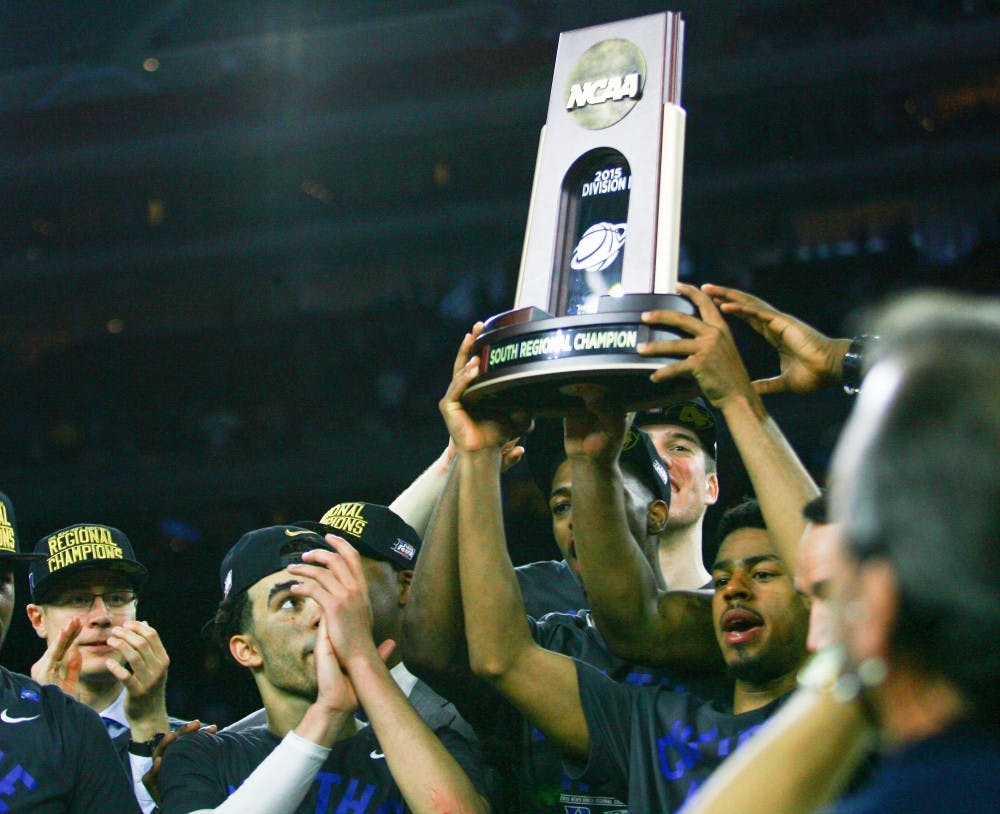"How much would you kill to be [22] years old and in your third year of covering a major college basketball team?"
"I would kill you dead right now."
That was the introduction I received from the co-hosts of The Average Joe Show on 1450 The Hall from the basketball Hall of Fame when I was brought on the radio to talk about Duke basketball hours before the national championship game.
With my career as senior Duke men's basketball beat writer in the rearview mirror, it truly is amazing to think about how fortunate I have been to have had this experience—without having to spill any blood I might add.
I went from being the spectator in the back of the room at meetings to the man who [unbeknownst to him] was endowed with the nickname "The Blogfather" in the halls of 301 Flowers. I went from being the infantile writer who was snidely asked if he had ever read a newspaper after submitting his first story to a writer who would travel to cover five NCAA Tournament games.
I saw shock and dismay in Indianapolis when Kevin Ware's tibia made a surprise appearance on the court. I saw devastation when seasons ended prematurely against Louisville and Mercer. And, of course, I saw elation: when Andre Dawkins made his triumphant return to basketball; when Jabari Parker poured in 30 to beat North Carolina at home; when Mike Krzyzewski earned his 1000th win in come-from-behind fashion at The Mecca of Basketball; when the nets came down at NRG Stadium.
But most of all, what I saw was, beneath the polished veneer and hero worship, the athletes we cover are just kids.
Have you seen Tyus Jones on the cover of Sports Illustrated? Is that not the face of an ecstatic child? The same face a three year old makes when handed an ice cream cone? A 16 year old makes when handed the keys to a car for the first time?
And just like every other kid, student-athletes experience the highest of highs and the lowest of lows. Watching and working with these kids for three years have left indelible marks on me, memories I will never forget, whether good or bad.
The locker room after Duke's loss to Mercer in the Round of 64 is one of those memories. Despite the room being loud, there was none of the usual lighthearted chatter from the players, just stunned silence and dutiful acknowledgement of the media. Gone were the smiling faces that I had seen every day on campus. All that was left were the microphones and cameras shoved unceremoniously into the tear-soaked faces of kids who just had their dreams dashed in humiliating fashion.
Tears isn't an exaggeration. There was Parker, to my right, fighting back the waterworks while unfathomably being asked about his future at Duke. There was Rodney Hood, at 12 o'clock, lamenting his utter failure as captain and leader in a barely audible whisper. And Dawkins, who worked so hard to come back to the game he loved, to my left with eyes glued to his shoe tops.
But most vividly I'll remember 20 year old Rasheed Sulaimon, sitting alone in the corner of the locker room—on the ground, not in a chair like his teammates. He was facing the wall, staring into the abyss, mercifully unaware of the insulting, intrusive camera man inches away, snapping pictures of his engrossing misery.
But as low as these moments are, the jubilation is just as high if not higher.
When the team advanced to the Elite Eight, Quinn Cook was just a few feet in front of me, overcome with emotion and burying his head in his coach's loving chest. Meanwhile, Matt Jones, coming off of the best game of his career, skipped to the sideline screaming, "We did it! Coach, we did it!" like a son would call out to his father.
The embraces on the court. The giggling as the nets were coming down. The high fives, elaborate hand shakes, and bear hugs given to one another during the ceremony. The giddy stripping of the locker room for every memento of their incredible accomplishment. It was all awe-inspiring. The euphoria was infectious as the severed net was passed from player to player in the locker room, from the captain Cook to the newcomer and walk-on Sean Kelly, with each player equally proud of both the accomplishment and their best friends.
The raw emotion, whether sorrowful or joyous, on display by these student-athletes through these three years have been eye-opening. If I've learned anything from my incredible opportunity over the last three years, it's that, regardless of fame or expected fortune, these student-athletes are just kids living their lives as such.
And I'm just a kid fortunate enough to have been awarded the opportunity of a lifetime.
Get The Chronicle straight to your inbox
Sign up for our weekly newsletter. Cancel at any time.

